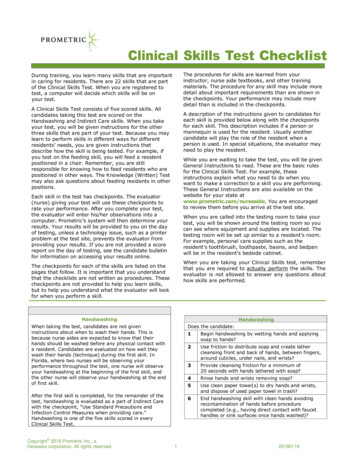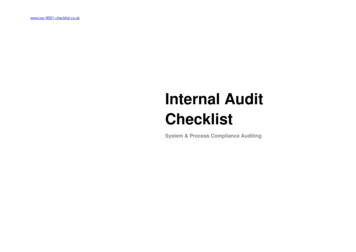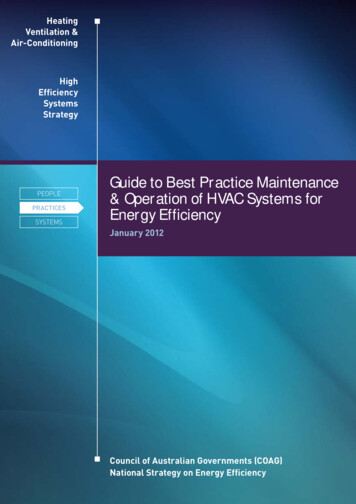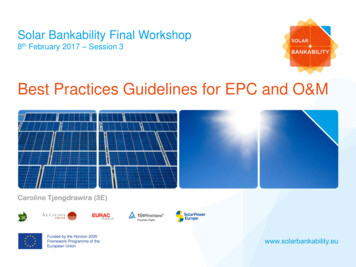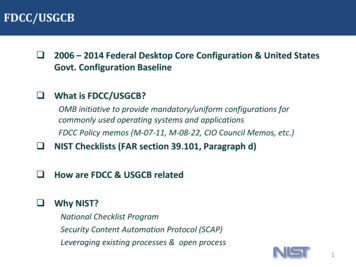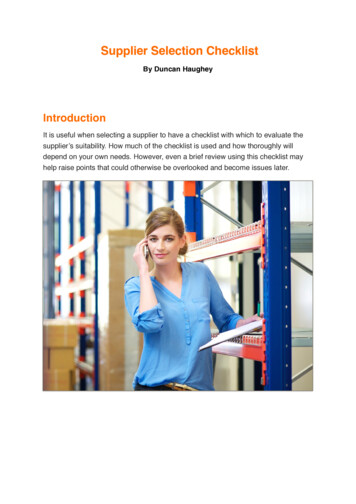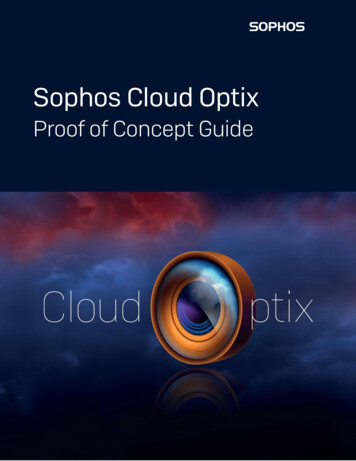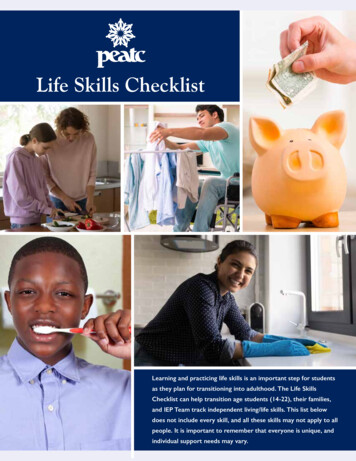
Transcription
Life Skills ChecklistLearning and practicing life skills is an important step for studentsas they plan for transitioning into adulthood. The Life SkillsChecklist can help transition age students (14-22), their families,and IEP Team track independent living/life skills. This list belowdoes not include every skill, and all these skills may not apply to allpeople. It is important to remember that everyone is unique, andindividual support needs may vary.
PERSONAL LIFE SKILLSBrushes teeth dailyShowers daily with soapWashes hairUses deodorant dailyCombs/brushes hairShaves, as neededChooses appropriate andclean clothes to wear basedon weather and occasionDresses themselvesCan use a cell phone (textor call) and knows how tocharge and update phonewhen neededCan set up and managepersonal voicemailCan use an alarm on phone,watch, and/or clockWashes hands/uses handsanitizer after usingrestroom, before eating, etc.Directs any support staff(e.g., personal care) whoprovide assistance with dailyliving and other needsAsks for help when neededMakes choices and decisionsabout their own lifeCan recognize and reportabuse, neglect, or dangerCan DoAlreadyNeeds MorePracticePlan to StartOngoingSupportNeededN/A
EMERGENCY/SAFETY SKILLSCan DoAlreadyNeeds MorePracticePlan to StartOngoingSupportNeededN/ACan DoAlreadyNeeds MorePracticePlan to StartOngoingSupportNeededN/AUnderstands fire exits andwhat to do in case of a fireCan use a fire extinguisherKnows when and how tocontact 911Knows how to interact withlaw enforcementKnows what to do if lockedout of the houseKnows when and how tounclog the sink or toiletKnows how to take care ofminor woundsDoes not open the door tostrangers or let strangers inCan lock household doorsTurns off stove after useAvoids cars that are movingin parking lotsKnows to seek out trustedadults when needing helpNUTRITION/DIETARY SKILLSCan make a grocery list andlook for items on the list inthe store or onlineKnows the differencebetween healthy andunhealthy foods and drinksCan tell when food is bad(expired dates, color, etc.)and knows not to eat itUnderstands and generallyeats a balanced diet
MONEY MANAGEMENT/FINANCIAL PLANNINGSKILLSKnows the value of coins andcurrencyCan make a purchase with acard or with cashUnderstands the conceptsof banking balance and overdraftsCan do simple math or use acalculatorKnows how to compareprices/use couponsUnderstands the differencebetween needs and wantsHas a bank account andis aware of financial limitswhen receiving governmentbenefits (e.g., Medicaid, SocialSecurity, etc.)Understands how to createand use a budgetUnderstands a paycheck(gross vs. net pay, deductions)Knows how and when to filefederal and state taxesKnows the importance ofpaying bills on time, includingthe impact of interest andlate payment penaltiesUnderstands the benefits andrisks of credit cards and whenit is appropriate to use themKnows their social securitynumber, when to use it, andhow to keep it safeCan DoAlreadyNeeds MorePracticePlan to StartOngoingSupportNeededN/A
HEALTHCARE SKILLSCan DoAlreadyNeeds MorePracticePlan to StartOngoingSupportNeededN/ACan DoAlreadyNeeds MorePracticePlan to StartOngoingSupportNeededN/AKnows how to get aprescription refilledCan take medication withoutsupervision and on timeUnderstands and obtainsnecessary immunizationsKeeps a calendar of medicalappointmentsCan let someone know if theyare not feeling wellKnows their height, weight,birthdateCan tell by looking at athermometer if they have afeverKnows how to locate theirhealth insurance card orinformationUnderstands what to do in caseof colds, flu, fever, or othercommon health problemsKnows how to reach medicalprovidersSEXUAL HEALTH SKILLSCan label body parts withcorrect termsUnderstands the need for andknows how to access variousforms of birth controlTakes care of menstrualperiods; maintains and usessuppliesUnderstands consent and howto give and recognize consentUnderstands private placesversus public placesUnderstands private behaviorversus public behavior
INTERPERSONAL/SOCIAL SKILLSCan DoAlreadyNeeds MorePracticePlan to StartOngoingSupportNeededN/ACan DoAlreadyNeeds MorePracticePlan to StartOngoingSupportNeededN/AIntroduces themselves to othersEngages in back-and-forthcommunication with othersUnderstands and managespersonal space as neededKnows how to ask (in someway) for helpIs courteous to othersKnows how to resolve conflictor how to ask for help toresolve conflictTakes turns (if game playing,e.g., bowling, cards)Says no to peers or others ifsomething feels wrongAccepts “no” for an answerKnows how to interruptappropriatelyExpresses anger orfrustration appropriatelyKITCHEN SKILLSSafely operates appliances(cooktop, oven, microwave,toaster, dishwasher,coffeemaker)Uses common kitchen tools(can opener, bottle opener,measuring cups and spoons,grater, etc.)Helps plan and prepare mealsfor selfCan follow a simple recipeCan wash and put away dishesand/or load and unload thedishwasherCan clean kitchen (includingcounters, floors, and removingtrash)
LAUNDRY SKILLSCan DoAlreadyNeeds MorePracticePlan to StartOngoingSupportNeededN/ACan DoAlreadyNeeds MorePracticePlan to StartOngoingSupportNeededN/APuts dirty clothes in hamper orother appropriate placeSorts clothes for properwashingKnows how to operate awasher and dryerKnows how to use laundrydetergentCleans lint screen after eachdrying cycleFolds clothesPuts their clothes awayHOUSEHOLD SKILLSCleans their bedroom,bathroom and other areas asneededMakes their bed and changesthe bedsheets as neededPuts items away in the correctlocationCan do minor repairs(e.g., change lightbulbs)Knows who to contact aboutmajor repairs (e.g., landlord,repair person, etc.)Picks up and disposes of trashTakes trash outside as neededOperates a vacuumSweeps and mops floors
Can DoAlreadyCOMMUNITY SKILLSNeeds MorePracticePlan to StartOngoingSupportNeededN/ACan use public transportation(taxi, bus, train, Uber/Lyft,paratransit, etc.)Knows to be alert in unfamiliarsettings and at nightConsistently wears a seatbeltLocates goods, services, andpeople using Internet searches(Google, phone listings, etc.)Orders from a menuCrosses streets safelyKeeps driver’s license or stateissued ID card updatedUses the post officeUses bank servicesKnows where to go to vote andhow to ask for accommodationsif neededThis document is excerpted and updated from the following documents and includes additional content created by PEATC.Adolescent Autonomy Checklist – Indiana University: bit.ly/2RXtUtULife Skills Inventory: Independent Living Skills Assessment Tool – Washington State DSHS: bit.ly/3xkA5XNIndependent Living Skills Checklist – ESC3: bit.ly/3vj52Kx800-869-6782 (toll free) 703-923-0010 800-693-3514 (fax)403 Holiday Ct, Suite 104, Warrenton, VA 20186VISIT US AT WWW.PEATC.ORGHablamos EspañolThe contents of this factsheet were developed under a grant from the Virginia Department of Education #H027A190107 and the US Departmentof Education, #H235F200001. However, those contents do not necessarily represent the policy of the US Department of Education, and youshould not assume endorsement by the Federal Government. Project Officer. PEATC is not a legal services agency and cannot provide legal advice orlegal representation.Any information contained in this training is not intended as legal advice and should not be used as a substitution for legal advice.
Life Skills Inventory: Independent Living Skills Assessment Tool - Washington State DSHS: bit.ly/3xkA5XN Independent Living Skills Checklist - ESC3: bit.ly/3vj52Kx 800-869-6782 (toll free) 703-923-0010 800-693-3514 (fax) 403 Holiday Ct, Suite 104, Warrenton, VA 20186
